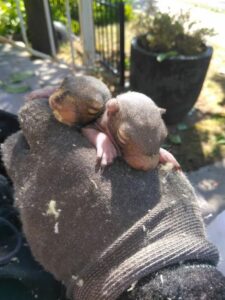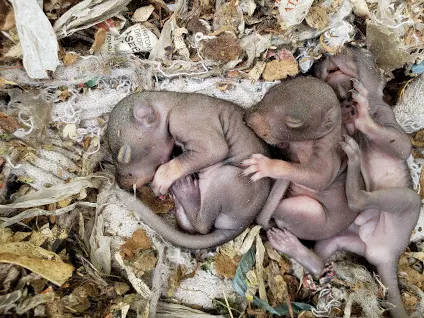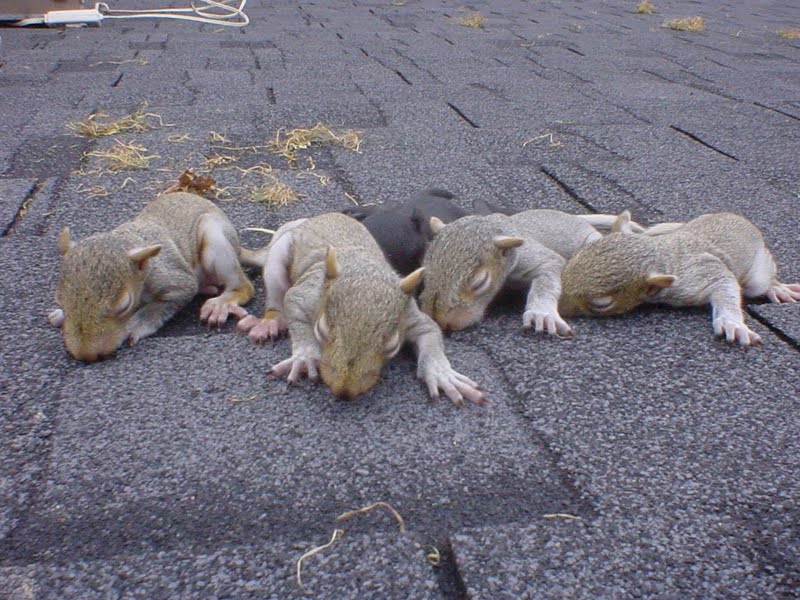Spring is the time of the year when nature and wildlife start to become active again. While the trees and flowers prepare to bloom, the furry critters begin to nest and have babies. Squirrels especially have lots of little ones during the late winter/early spring and again in late summer, so there’s a good chance you may stumble upon a baby squirrel in a park, your back yard or even your attic. Here are a few things you can do if you find a baby squirrel to minimize human contact and maximize the chances of safely reuniting them with their family.
Baby Squirrels in the Wild – Stop and Watch
 If you happen upon a baby squirrel on the ground, be sure to stop and look around for adult squirrels. It is important to keep any contact you have with the baby at a minimum. An infant squirrel cared for by its mother in nature has the best odds to survive and thrive. We recommend contacting your local wildlife control company for help instead of taking action.
If you happen upon a baby squirrel on the ground, be sure to stop and look around for adult squirrels. It is important to keep any contact you have with the baby at a minimum. An infant squirrel cared for by its mother in nature has the best odds to survive and thrive. We recommend contacting your local wildlife control company for help instead of taking action.
Humans interfering with nature is not advised. It’s best to wait and watch to see if the mother retrieves the baby before doing anything that may decrease the squirrel’s chances for survival. Even if they get the utmost human care, wildlife babies have the best odds to live if they are cared for by their own parents. Also, the developmental stages of wildlife vary, so even if a small squirrel looks like a baby, it could be an independent juvenile that doesn’t require help.
The wildlife technicians may recommend you step in and keep the baby safe and comfortable while waiting for the mother to return. If that is the case, find a shallow open container, create a heat source and place it securely inside the container. You can use a sealed hot water bottle filled with warm water and wrapped in a towel or simply fill a sock with uncooked rice or birdseed, tie it off and warm it in the microwave for 30 seconds to a minute.
Next, put on a pair of gloves and place the baby in the container with the secured heat source. If you found the squirrel under a tree, that’s probably where it fell from the nest, so place the container under that tree and move away. Watch to see what happens from a good distance. A squirrel mom will not recover her baby at night, so if she hasn’t returned for her baby before nightfall, call your local wildlife control company or a licensed wildlife rehabilitation facility for advice on what to do.
Baby Squirrels in Your Attic – Call a Professional
Baby squirrels in your home or attic should be removed by skilled wildlife specialists. Mother squirrels out gathering food will usually return when they hear the cries of their young. However, if you disturb their nests, they may be reluctant to come back. Contact wildlife control professionals who are trained to handle babies and allow them to humanely extract and relocate the squirrels so the family stays intact.

Partner With the Durham Squirrel Removal Experts
If you encounter a baby squirrel or any newborn wildlife, remember to interfere as little as possible to encourage a successful reunion of the animal’s family. We recommend you first contact your local wildlife control company for assistance or advice. Our friendly technicians at Skedaddle Humane Wildlife Control are highly trained in the humane removal and relocation of adult and infant animals for safe and speedy squirrel removal Durham residents and business owners can rely on. Contact us online for more information about resolving any wildlife conflict you may have.



